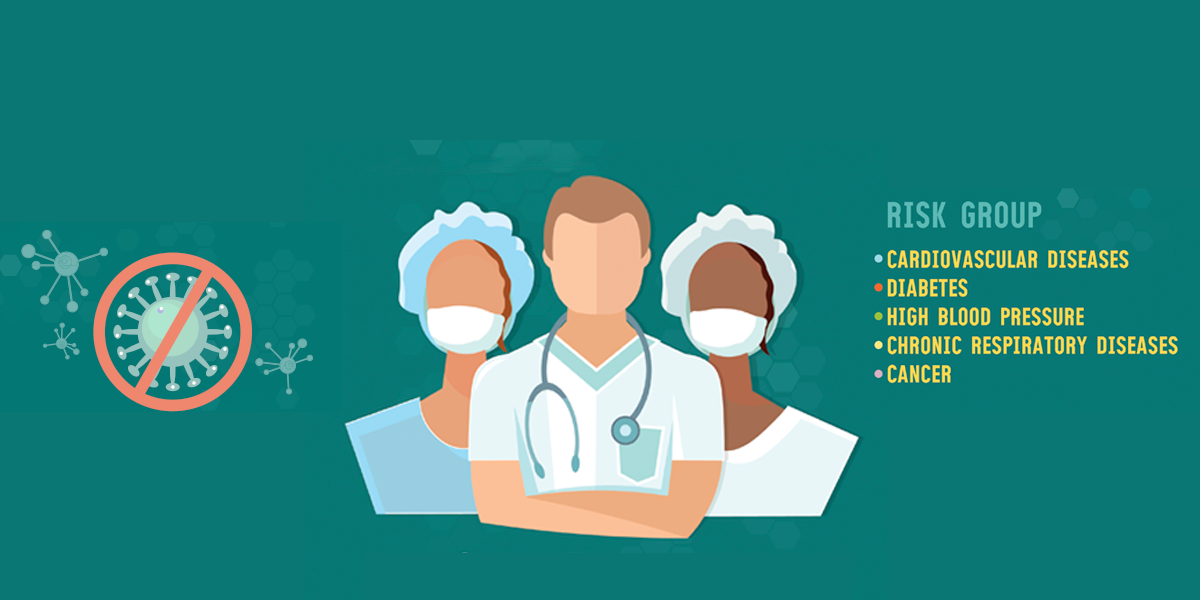People Who Are at Higher Risk for Severe Illness
 Follow established measures to protect yourself and others
Follow established measures to protect yourself and others
- Know how it spreads
- Wash your hands often with soap and water or an alcohol-based hand rub
- Stay home as much as possible
- Avoid close contact with people who are sick, even inside your home
- Maintain physical distancing (1.5 meters/6 feet) from other people
- Avoid touching your eyes, nose, and mouth
- Practice respiratory hygiene: cover your mouth and nose with a face cover when around others and cover coughs and sneezes
- Clean and disinfect
- Monitor your health
Source: Centers for Disease Control
#Older adults
If you are over 65 years of age, you are likely to experience severe symptoms and are more likely to need intensive hospital care if you contract COVID-19. Stay home as much as possible and follow the above listed measures.
#People living with heart disease
People who have heart disease or hypertension are more likely to be infected with COVID-19 and develop severe symptoms. Also, those who have suffered a stroke and might have a weakened immune system need to be more careful.
What should people living with heart disease do if they get the virus?
If you are showing symptoms such as coughing, sneezing, fever or shortness of breath you may need assessment by healthcare professionals. Start self-quarantine, avoid any contact with others and call the COVID-19 hotline on 16000.
Practice the established 'sick day rules' for people with heart disease:
- Check your blood pressure more often
- Reduce sodium (salt) and fat (which leads to higher cholesterol) in your diet
- Make sure you take your heart medication
- If you live alone and have to go out, only do so with a family member or a friend
#People living with diabetes
People with type 1, type 2 or gestational diabetes may have a higher risk of severe illness from COVID-19. People with diabetes, whose blood sugar levels are often higher than their target, are also more likely to have diabetes-related health problems. Those health problems can make it harder to overcome COVID-19.
What should people living with diabetes do if they get the virus?
If you are showing symptoms such as coughing, fever or shortness of breath you may need assessment by a healthcare professional. Start self-quarantine, avoid any contact with others and call the COVID-19 hotline on 16000.
Practice the established 'sick day rules' for people with diabetes:
- Continue taking your diabetes medication. In fact, you may need your treatment increased when sick – speak with your diabetes care team available through the Diabetes Hotline 16099 - select option 4 (available seven days a week from 7am to 10 pm)
- Check your blood sugar/glucose levels every four hours at minimum
- Drink more water – hydration is essential
- Eat frequent small meals
- Delay any dieting but be careful not to overeat
- Rest and postpone physical activity
- If you live alone, get support from a family member or a friend
#Expectant mothers
Currently, limited information is available for the impact of COVID-19 on pregnant women. At present, there is no evidence to suggest that they are at higher risk of severe illness than the general population. However, due to changes in their bodies and immune systems, it is known that pregnant women can be badly affected by some respiratory infections. It is therefore important for expectant mothers to report possible symptoms (including fever, cough or difficulty breathing) to their healthcare provider.

Contributors: Ms. Raji Anand, Dr. Sohaila Cheema and Dr. Sathyanarayanan Doraiswamy
Editing: Mr. John Hayward